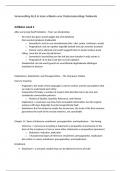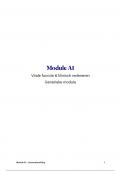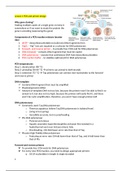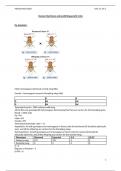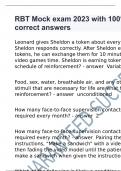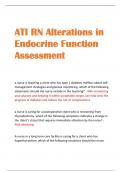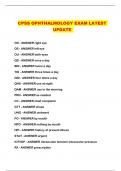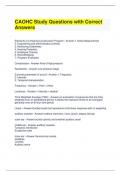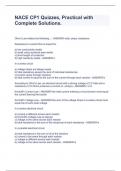Samenvatting ALLE te lezen artikelen voor Onderzoekscollege Taalkunde
Artikelen week 2
Alles wat je zegt heeft betekenis – Marc van Oostendorp
- Een mens kan geen woord zeggen dat niets betekent
- Drie soorten betekenis (taalkunde)
o Semantisch: staat in een woordenboek (kat = dier, poten, snorharen, staart)
o Pragmatisch: wat een spreker eigenlijk bedoelt met zijn woorden (context)
o Sociaal: wat je allemaal over jezelf weggeeft door te praten zoals je praat
- Uiting: ‘Jouw kat zit weer bij mij binnen’
o Semantisch: beschrijving van het feit dat jouw huisdier in mijn ruimte is
o Pragmatisch: ik eis dat je dat dier nu komt ophalen
- Modulariteit: de taal wordt geacht uit verschillende afgebakende afdelingen
(modules) te bestaan
Implicatures, Entailments, and Presuppositions – The Ling Space (Video)
Clues to meaning
- Pragmatics: the study of how language is used in context, and the assumptions that
we make to understand each other
- Cooperative Principle: a number of maxims that describe how to be nice and
considerate conversation partners
o Maxims of Quality, Quantity, Relevance, and Manner
- Implicature: a conclusion we draw from incomplete information, but the original
sentence still stays (logically) true (but pragmatically bad)
- Entailment: the first sentence entails the second one, the truth of the first sentence
guarantees the truth of the second sentence, not cancellable
Chapter 14. Types of inference: entailment, presupposition, and implicature – Yan Huang
- Inference = a process of accepting a statement or proposition (conclusion) on the
basis of the acceptance of one or more other statements or propositions (premises)
o Deduction, induction, abduction
o 3 fundamental types of inference: entailment, presupposition, implicature
- Aim article: to assess entailment, presupposition, and implicature
Entailment
Entailment = a semantic relation that can be defined in terms of truth
, o A proposition p entails a proposition q if and only if the truth of p guarantees
the truth of q
o P: All of the university’s professors are hard-working
Q: Some of the university’s professors are hard-working
- Propositional equivalence
o The little hut was hidden by the trees
o The little hut was concealed by the trees
- Contradictory
o No one likes dark tourism
o At least someone likes dark tourism
- Contradiction
o ?John isn’t married, but his wife is a feminist
- Contrariety
o This skirt is blue
o This skirt is red
Presupposition
Presupposition = a proposition or inference whose truth is taken for granted in the
utterance of a sentence
- Main function: act as a precondition of some sort for the appropriate use of that
sentence
- Presupposition triggers = lexical items and linguistic constructions that give rise to
presuppositions
- Definite descriptions
o The king of France is bald
o There is a king of France
- Factive predicates
o Epistemic or cognitive factives
John knows that smoking is a dangerous pastime
Smoking is a dangerous pastime
o Emotive factives
John regrets that he has gone on the stage
John has gone on the stage
- Aspectual/change of state predicates
o Mary has stopped beating her boyfriend
o Mary has been beating her boyfriend
- Iteratives
o John returned to Berlin
o John was in Berlin before
- Implicative predicates
o John managed to give up binge drinking
o John tried to give up binge drinking
- Temporal clauses
, o After she left school, Jane worked as a secretary
o Jane left school
- Cleft sentences
o It was the porter who called a taxi for John
o Someone called a taxi for John
- Counterfactual conditionals
o If an ant was big as a human being, it could run five times faster than an
Olympic sprinter
o An ant is not as big as a human being
- Presuppositions exhibit 2 main properties
o Constancy under negation = a presupposition is generated by the use of a
lexical item (if S is true, then p is true | if S is false, then p is (still) true)
o Defeasibility = presuppositions are cancelled if they are inconsistent with
background assumptions, conversational implicatures, and certain discourse
contexts
- Theoretical issues and analyses
- 3 main theoretical issues in accounting for presupposition
o Presupposition failure
o The origin of presupposition
o Projection problem of presupposition
Filtering-satisfaction analysis: a presupposition is not cancellable
Implicature
Conversational implicature = any meaning implied or expressed by, and inferred or
understood from, the utterance of a sentence which is meant without being part of
what is strictly said
- Vb.: Some of the tourists are admiring the view +> Not all of the tourist are…
o Property of defeasibility: conversational implicatures can simply vanish in
certain (non-)linguistic contexts
o Property of non-detachability: any linguistic expression with the same
semantic content tends to carry the same conversational implicature
o Property of calculability: they can transparently be derived via the
cooperative principle and its component maxims
o Property of non-conventionality: they are non-coded in nature, they rely on
the saying of what is said but are not part of it
o Property of reinforceability: they can be made explicit without producing too
much of a sense of redundancy
o Property of universality: they tend to be universal, because they are
motivated rather than arbitrary
o Property of indeterminacy: some of them may be indeterminate
- A conversational implicatures can be engendered in 2 distinct ways
o It can arise from strictly observing the maxims of conversation
o It can be generated by way of a speaker’s ostentatiously flouting the maxims
Artikelen week 2
Alles wat je zegt heeft betekenis – Marc van Oostendorp
- Een mens kan geen woord zeggen dat niets betekent
- Drie soorten betekenis (taalkunde)
o Semantisch: staat in een woordenboek (kat = dier, poten, snorharen, staart)
o Pragmatisch: wat een spreker eigenlijk bedoelt met zijn woorden (context)
o Sociaal: wat je allemaal over jezelf weggeeft door te praten zoals je praat
- Uiting: ‘Jouw kat zit weer bij mij binnen’
o Semantisch: beschrijving van het feit dat jouw huisdier in mijn ruimte is
o Pragmatisch: ik eis dat je dat dier nu komt ophalen
- Modulariteit: de taal wordt geacht uit verschillende afgebakende afdelingen
(modules) te bestaan
Implicatures, Entailments, and Presuppositions – The Ling Space (Video)
Clues to meaning
- Pragmatics: the study of how language is used in context, and the assumptions that
we make to understand each other
- Cooperative Principle: a number of maxims that describe how to be nice and
considerate conversation partners
o Maxims of Quality, Quantity, Relevance, and Manner
- Implicature: a conclusion we draw from incomplete information, but the original
sentence still stays (logically) true (but pragmatically bad)
- Entailment: the first sentence entails the second one, the truth of the first sentence
guarantees the truth of the second sentence, not cancellable
Chapter 14. Types of inference: entailment, presupposition, and implicature – Yan Huang
- Inference = a process of accepting a statement or proposition (conclusion) on the
basis of the acceptance of one or more other statements or propositions (premises)
o Deduction, induction, abduction
o 3 fundamental types of inference: entailment, presupposition, implicature
- Aim article: to assess entailment, presupposition, and implicature
Entailment
Entailment = a semantic relation that can be defined in terms of truth
, o A proposition p entails a proposition q if and only if the truth of p guarantees
the truth of q
o P: All of the university’s professors are hard-working
Q: Some of the university’s professors are hard-working
- Propositional equivalence
o The little hut was hidden by the trees
o The little hut was concealed by the trees
- Contradictory
o No one likes dark tourism
o At least someone likes dark tourism
- Contradiction
o ?John isn’t married, but his wife is a feminist
- Contrariety
o This skirt is blue
o This skirt is red
Presupposition
Presupposition = a proposition or inference whose truth is taken for granted in the
utterance of a sentence
- Main function: act as a precondition of some sort for the appropriate use of that
sentence
- Presupposition triggers = lexical items and linguistic constructions that give rise to
presuppositions
- Definite descriptions
o The king of France is bald
o There is a king of France
- Factive predicates
o Epistemic or cognitive factives
John knows that smoking is a dangerous pastime
Smoking is a dangerous pastime
o Emotive factives
John regrets that he has gone on the stage
John has gone on the stage
- Aspectual/change of state predicates
o Mary has stopped beating her boyfriend
o Mary has been beating her boyfriend
- Iteratives
o John returned to Berlin
o John was in Berlin before
- Implicative predicates
o John managed to give up binge drinking
o John tried to give up binge drinking
- Temporal clauses
, o After she left school, Jane worked as a secretary
o Jane left school
- Cleft sentences
o It was the porter who called a taxi for John
o Someone called a taxi for John
- Counterfactual conditionals
o If an ant was big as a human being, it could run five times faster than an
Olympic sprinter
o An ant is not as big as a human being
- Presuppositions exhibit 2 main properties
o Constancy under negation = a presupposition is generated by the use of a
lexical item (if S is true, then p is true | if S is false, then p is (still) true)
o Defeasibility = presuppositions are cancelled if they are inconsistent with
background assumptions, conversational implicatures, and certain discourse
contexts
- Theoretical issues and analyses
- 3 main theoretical issues in accounting for presupposition
o Presupposition failure
o The origin of presupposition
o Projection problem of presupposition
Filtering-satisfaction analysis: a presupposition is not cancellable
Implicature
Conversational implicature = any meaning implied or expressed by, and inferred or
understood from, the utterance of a sentence which is meant without being part of
what is strictly said
- Vb.: Some of the tourists are admiring the view +> Not all of the tourist are…
o Property of defeasibility: conversational implicatures can simply vanish in
certain (non-)linguistic contexts
o Property of non-detachability: any linguistic expression with the same
semantic content tends to carry the same conversational implicature
o Property of calculability: they can transparently be derived via the
cooperative principle and its component maxims
o Property of non-conventionality: they are non-coded in nature, they rely on
the saying of what is said but are not part of it
o Property of reinforceability: they can be made explicit without producing too
much of a sense of redundancy
o Property of universality: they tend to be universal, because they are
motivated rather than arbitrary
o Property of indeterminacy: some of them may be indeterminate
- A conversational implicatures can be engendered in 2 distinct ways
o It can arise from strictly observing the maxims of conversation
o It can be generated by way of a speaker’s ostentatiously flouting the maxims

